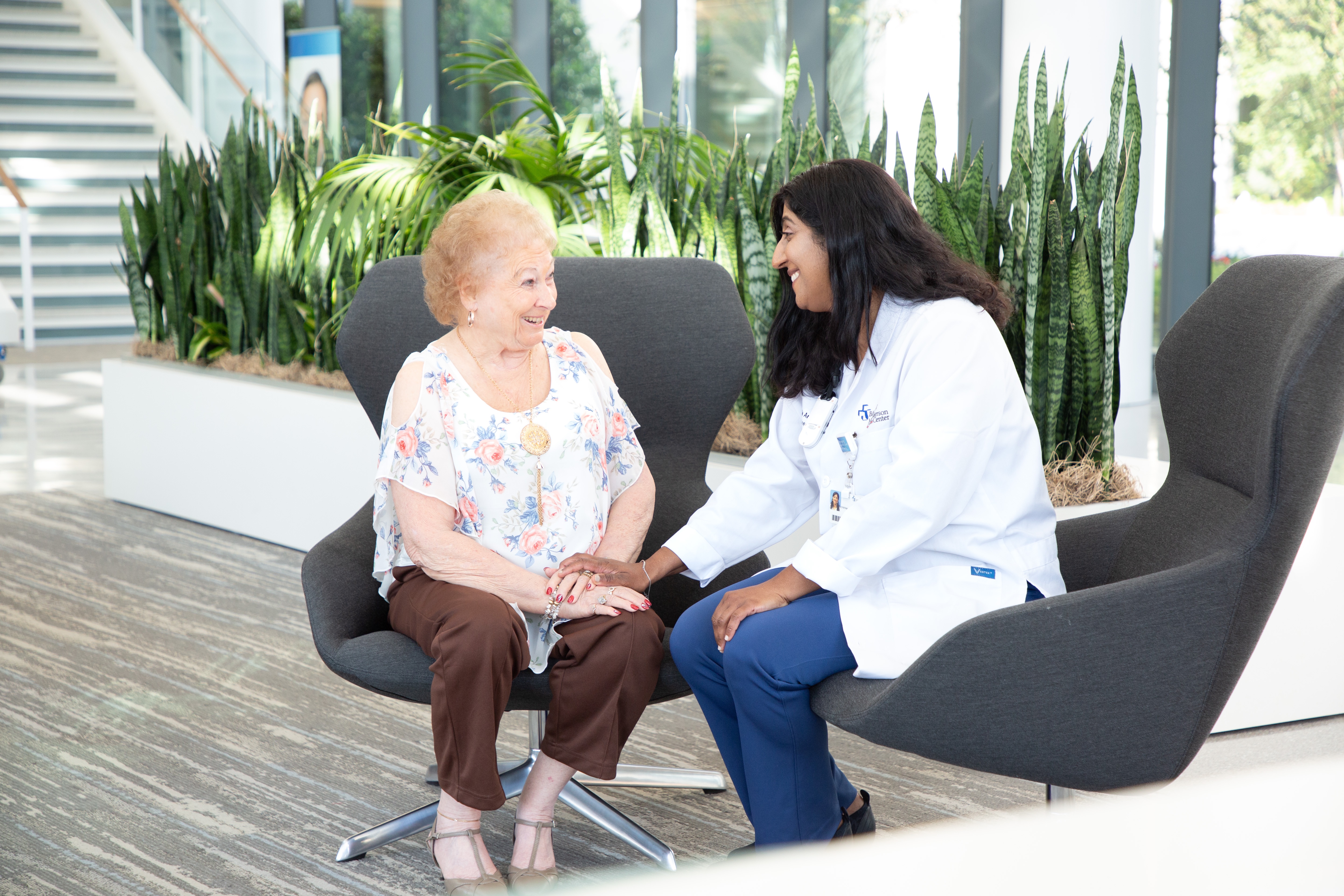
Understanding breast cancer
Early Detection
It is estimated that one in eight women in the United States will develop breast cancer in her lifetime. Early detection of breast cancer is key. Finding cancer before it spreads generally provides more treatment options.
Early breast cancer doesn’t always cause symptoms, which is why regular breast exams and mammograms are so important. This approach has been shown to save lives. The survival rate in breast cancer diagnosed at an early stage has been documented 93% or higher in the first five years. This is compared to 27% for those diagnosed with an advanced stage breast cancer.
Early Detection Starts With You
Know the Symptoms of Breast Cancer
If you experience these symptoms, see your primary care doctor and ask for an evaluation. Common breast cancer symptoms include:
- Skin irritation or dimpling
- Nipple pulling inward
- Breast or nipple pain
- Lump or mass in breast
- Lump or mass in armpit
- Redness or scaliness
- Thickened skin
- Swelling
- Nipple discharge
Know Your Risk of Developing Breast Cancer
Some women have a higher risk of developing breast cancer in their lifetime and may need to be screened earlier and more often than other women. Our High-Risk Breast Screening and Prevention Clinic provides a comprehensive breast cancer risk assessment to determine your estimated risk of developing breast cancer and if you qualify for high-risk breast screening. This clinic may be right for you if you have one or more of the several risk factors that have been associated with an increased risk of developing breast cancer.
- You or a family member tested positive for BRCA1, BRCA2, or other genetic mutations that increase breast cancer risk.
- Your family tested negative for genetic mutations but has a strong family history of breast cancer.
- You have been told your breasts appear dense on mammograms
- You have had a benign or precancerous breast biopsy*
- You have a personal or family history of ovarian cancer
- You have a family history of breast cancer in your mother, father, sibling, or at least two other close blood relatives
- You have had prolonged estrogen exposure due to starting periods before age 12 or taking hormonal therapy after menopause
- You gave birth to your first child after age 30 or have never been pregnant
- You received radiation therapy to the chest between ages 10-30
- Ashkenazi Jewish descent
*Initial evaluation and management of an abnormal breast biopsy is completed with the Baptist MD Anderson Benign Breast Clinic. Once appropriate, you will be referred to the High-Risk Breast Screening and Prevention Clinic for long-term surveillance.
Lifestyle Risk Factors
There is no sure way to prevent breast cancer, but there are ways to decrease your risk. There are several modifiable risk factors based on lifestyle choices or exposure that may increase your risk for developing cancer. Healthy lifestyle choices can help reduce the risk of developing breast cancer. Some lifestyle or exposure risk factors associated with breast cancer include
- Alcohol
- Obesity
- Lack of Exercise
- Late or No Children
- Not Breastfeeding
- Hormonal Birth Control
- Hormone Therapy
- Smoking
Early detection starts with you
Prevention and Screening
More than ever, patients are taking a proactive approach to their breast health. At our Breast Screening and Prevention Clinic, we help women - and men - assess their risk and weigh their decisions for care. For more information or to make an appointment at the Breast Screening and Prevention Clinic.
Evaluating your health
Your Care Starts with Screening
Screening is your greatest weapon against breast cancer by improving your chances of finding cancer early on when it is easier to treat. The American Cancer Society recommends yearly screening for all as early as 40.
Your screening exams may include:
- Mammograms
- Dense breast program
- Breast MRI
- Breast exams
- Automated breast ultrasound

Convenient, comfortable and fast
Regularly Scheduled Mammograms
As the regional leader in comprehensive breast care, all Baptist Health locations offer digital mammograms. The Margaret and Robert Hill Breast Center at Baptist MD Anderson Cancer Center offers digital, 3D imaging and minimally invasive procedures.
To take the stress out of your visit, our breast health services are designed to be quick, convenient and supportive. Locations for our breast health services were designed with your comfort and privacy in mind. With digital mammography, the procedure can be done quickly – something our patients appreciate. We offer mobile and free options as well so that it's easier than ever to prioritize your health.
Mammography
Additional Resources
Pink Ribbon Jax
Pink Ribbon Jax and Baptist Health are providing 2,500 no-cost mammograms to qualified community members.
Buddy Bus
To improve access to mammograms, Baptist MD Anderson Cancer Center and First Coast News partnered together to create the Buddy Bus for mobile mammography.
Buddy Check 12
This self-exam program provides free kits with step-by-step instructions for breast self-examination and self-awareness.
Contact Us
If you have any questions, we have you covered. We have nurse navigators available to guide you through every step of your care. Request an appointment or speak to a nurse navigator by phone or online.

Our Location
Breast Cancer Clinic
Within our specialized clinics we bring together our team of experts to care for you - mind, body and spirit - all under one roof. Each of our clinics are singularly focused on your specific needs and treatment.
Need Directions? The breast cancer clinic is located in the main Baptist MD Anderson Cancer Center on Floor 7 of our cancer center.
For screening and prevention, services are located across the street:
Find a Doctor
Our care team brings medical oncologists, radiation oncologists, surgeons and other specialists together for each patient.
For whatever step is next,
Baptist MD Anderson is Here for You
Our team of experts are ready to help you navigate the whirlwind of emotions, options and decisions through every aspect of your care.
Get a second opinion
The right treatment starts with the right diagnosis.
Find a support service
Care for your mental, spiritual health, too.
Prepare for your appointment
See everything you need to know before coming in.

I had the most wonderful help, care and support from everybody there. The entire team takes the time to answer your questions and to just sit with you.
Joanie Heighes
After finishing her radiation treatments, Joanie shares her patient perspective on the Baptist MD Anderson Cancer Center.


